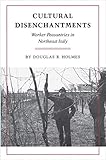Cultural Disenchantments : Worker Peasantries in Northeast Italy / Douglas R. Holmes.
Material type: TextPublisher: Princeton, NJ : Princeton University Press, [2021]Copyright date: ©1990Description: 1 online resource (255 p.)Content type:
TextPublisher: Princeton, NJ : Princeton University Press, [2021]Copyright date: ©1990Description: 1 online resource (255 p.)Content type: - 9780691225753
- Peasants -- Italy -- Cividale del Friuli Region
- Working class -- Italy -- Cividale del Friuli Region
- SOCIAL SCIENCE / Anthropology / General
- Bottenicco
- Bretell, Caroline
- Carrasco, Pedro
- Cividale del Friuli
- Consiglio communale
- Douglass, William
- Dublin, Thomas
- Durkheim, Emile
- Eley, Geoff
- Friuli region
- Gramsci, Antonio
- Guiotto, Luigi
- Habermas, Jurgen
- Hansen, Edward
- Hennis, Wilhelm
- Holmes, Douglas
- Inquisition
- Kertzer, David
- Le Play, Frédéric
- Marx, Karl
- Moimacco
- Movimento Friuli
- Silverman, Sydel
- Venice
- accountancy
- agricultural production
- benandanti
- braccianti
- capitalism
- contracts
- cossans
- cultural disenchantment
- ethnicity
- evil eye
- famei
- family
- fascism
- feudalism
- fieldwork
- gastaldi
- industry
- latifondi
- operai
- padroni
- patronage
- rationalization
- reification
- social security
- tenancy
- wage earning
- 305.5/63
- HD8490.C582
- HD8490.C582 .H656 1989
- online - DeGruyter
| Item type | Current library | Call number | URL | Status | Notes | Barcode | |
|---|---|---|---|---|---|---|---|
 eBook
eBook
|
Biblioteca "Angelicum" Pont. Univ. S.Tommaso d'Aquino Nuvola online | online - DeGruyter (Browse shelf(Opens below)) | Online access | Not for loan (Accesso limitato) | Accesso per gli utenti autorizzati / Access for authorized users | (dgr)9780691225753 |
Frontmatter -- Contents -- Illustrations -- Tables -- Acknowledgments -- CHAPTER 1 Terrain of Inquiry -- CHAPTER 2 Traditional Society and Its Disenchantments -- CHAPTER 3 Peasant-Worker Society -- CHAPTER 4 The Latifondo -- CHAPTER 5 Agrarian Politics -- CHAPTER 6 Elements of Folk Consciousness -- CHAPTER 7 The Industrial Realm -- CHAPTER 8 Conclusion -- Notes -- References -- Index
restricted access online access with authorization star
http://purl.org/coar/access_right/c_16ec
Douglas Holmes develops the concept of peasant-worker society to analyze a kind of social formation that has until now gone largely unrecognized and unstudied. His book portrays the dissonant crosscurrents created at the interface of urban industrial and rural peasant spheres. Examining the region of Friuli in northeast Italy, it shows how wage labor was adopted by country folk who maintained ties to small-scale cultivation and indigenous traditions. Holmes draws on the Weberian notion of the "disenchantment of the world" to examine the cultural issues that animate peasant-worker life. What emerges is a vivid picture of the economic, political, religious, and ethnic struggles that infuse the peasant-worker milieu, as traditional representations of reality are pitted against bureaucratic definitions and formulas emanating from Church, state, and market institutions. In addition to providing a general theoretical framework for the analysis of peasant-worker society and culture, Cultural Disenchantments is the first anthropological study of Friuli to be published in English. As such, it elaborates on the historical insights developed by Carlo Ginzburg in his famous study of sixteenthcentury agrarian cults and folk traditions in Friuli.
Mode of access: Internet via World Wide Web.
In English.
Description based on online resource; title from PDF title page (publisher's Web site, viewed 01. Dez 2022)


